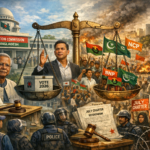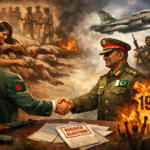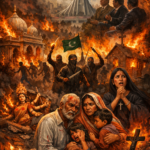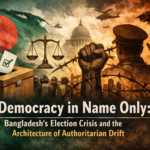By: South Asia Corner Editorial Desk
Published: 19 June 2025
In the volatile aftermath of Bangladesh’s so-called “July Revolution” of 2024, a new and far more dangerous chapter appears to be unfolding—one that threatens to destabilise the country’s fragile democratic fabric and plunge it into a deep authoritarian abyss.
At the heart of this crisis is the now-collapsed alliance between two key Islamist actors: Hizb ut-Tahrir (HuT) and Jamaat-e-Islami (JI). For years, this unlikely partnership operated in the shadows of Bangladesh’s political and military institutions, attempting to weave an ideological net that spanned campuses, civil society, and even the armed forces. But in 2025, the marriage is over, and the consequences could be dire.
The HuT–Jamaat Alliance: Born of Strategy, Killed by Ideology
HuT and Jamaat once shared a common enemy: secular nationalism. Their mutual disdain for liberal democracy and the nation-state model brought them together. Jamaat, with its decades-old political infrastructure, grassroots networks, and religious branding, provided the ideal gateway for HuT’s more radical cadres to spread their doctrine and recruit from within elite institutions—including the officer corps of the armed forces.
But that alliance was always one of strategic convenience, not ideological alignment. The break was inevitable, and in 2025, it has finally and explosively occurred.
Here’s why:
-
Jamaat wants electoral legitimacy. Despite past failures, it remains invested in the democratic process, hoping to claw back political relevance through the ballot box.
-
Jamaat plays the long game, focusing on institution-building, business ventures, and moderate public messaging to embed itself slowly into state structures.
-
Its goal is a pseudo-modern Islamic state—not a medieval theocracy. It promotes a middle-class, conservative image palatable to urban voters.
-
HuT, by contrast, wants it all now. It envisions a total overhaul—a theocratic Khilafah state, dismantling the Bangladeshi Republic, erasing democratic norms, and re-engineering society under rigid Sharia law.
This divergence has reached a breaking point. HuT sees Jamaat as ideologically corrupt and politically compromised. Jamaat sees HuT as dangerously reckless, with no concern for the consequences of direct confrontation with the state.
The Coup Cloud Over Dhaka
Now operating independently, HuT is allegedly planning a military coup, activating dormant networks within the Bangladesh Armed Forces. Sources suggest that junior and mid-level officers—many recruited through madrasa-backed educational institutions and university-based Islamic study circles—are being groomed for a power grab.
Encrypted communications between Bangladesh-based HuT operatives and counterparts in the UK, Turkey, and Jordan indicate the existence of a broader coordination framework. The group’s goal: to seize power and immediately implement a hardline Khilafat regime.
This is no longer fringe speculation. This is a clear and present danger.
What’s at Stake?
If such a coup succeeds, Bangladesh may be lost to despotism for a generation. The constitution will be suspended. Women’s rights, minority protections, press freedom—all will be among the first casualties. Political opponents will be declared enemies of Islam. Dissent will be labelled apostasy.
But it’s not just Bangladesh that would suffer:
-
India would face a radicalised neighbour, with implications for its Northeast border security and growing fears of ideological contagion.
-
Myanmar would see renewed refugee flows as minorities flee persecution.
-
China, deeply invested in Bangladesh’s ports and power grids, would face dilemmas of engagement with an anti-secular regime.
-
The West, particularly the UK and the US, will find themselves caught between condemnation and realpolitik—risking a new Cold War-style standoff in the Bay of Bengal.
Still Time to Act—But Barely
The window to contain this threat is narrowing. Civil society must be mobilised. Bangladesh’s political centre, weakened but not dead, must regroup. The military must purge radical infiltrators from its ranks. International actors must engage now—not react later.
A HuT-led coup in Bangladesh would not just be a national tragedy; it would be a regional disaster and a global cautionary tale. What unfolds next will define not only Bangladesh’s future—but the fate of pluralism in South Asia.
South Asia Corner remains committed to exposing ideological extremism and authoritarian drift in the region. For analysis, updates, and ground reports, follow us at www.southasiacorner.org.






